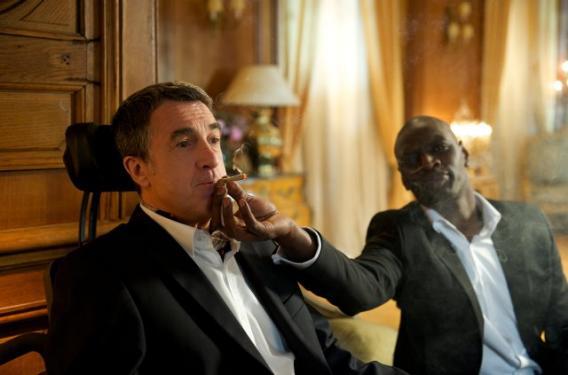It’s a story about a white man and a black man. The white man is rich and paralyzed from the neck down; the black man is an ex-con from the projects. The former needs a caretaker; the latter needs someone to turn his job application down, so he’ll be eligible for unemployment benefits. They meet. They clash. And, against all odds, Driss, the black man, starts working for Philippe, the white man.
That’s the plot of The Intouchables, France’s second biggest box-office hit ever, brought to American screens this weekend by the Weinstein Company. And that storyline has prompted many American critics to label the film “racist.” In Variety, Jay Weissberg describes it as “the kind of Uncle Tom racism one hopes has permanently exited American screens.” Stephen Holden in the New York Times says the film exploits “every hoary stereotype of the black man as cultural liberator.” In their words, Omar Sy, who plays Driss, is a French Viola Davis, only more compromised: Like the Oscar-nominated actress from The Help, they express regret that Sy is getting his due as an actor for such a demeaning role—in this case, the part of a “Magical Negro.”
Like many French people, I disagree with this analysis—but also find it hard to argue against here in my adopted home. Black men or women who have taken servile roles in American movies have met disapproval going back at least as far as Hattie McDaniel, who received an Academy Award for her portrayal of the maid in Gone With the Wind. At the time, McDaniel said that acting as a mammy was more profitable than being one. Omar Sy became the first black actor to receive a Cesar, the French equivalent of an Academy Award, thanks to his performance in The Intouchables. That my native country waited so long to recognize black talent is far more outrageous than the movie he was rewarded for. In fact, from a French perspective, the movie isn’t outrageous at all.
The Intouchables found its inspiration in a true story, that of Philippe Pozzo di Borgo and Abdel Sellou, originally from Algeria. According to the Variety piece, the fact that an Arab’s life became a black man’s part on screen is a “telling” element of the film’s “offensive” stance on race. Yet if those roles seemed interchangeable to directors Olivier Nakache and Eric Toledano, it’s perhaps because the movie goes beyond race to tackle a wider social issue in France.
Driss and Philippe come from worlds used to ignoring each other until they collide—and collide they do, sometimes with deadly results. In 2005, riots in the French “banlieues” after the death of two teenagers who were chased by police prompted the French government to declare a state of emergency. Privileged France trembled at the idea that the French poor would burn down the city, overtaking the Eiffel Tower or the Champs Elysees. More than 2,500 people were arrested. The Intouchables says both worlds can live—and conquer—together. For the French, if this movie is to be criticized, it’s for being delusional and politically correct, not racist. It describes a world “without social conflicts, without modernity, without crisis,” as the French daily Libération put it.
The “Magical Negro” is a token black character who helps a white protagonist fulfill his quest. But the protagonist of The Intouchables is Driss, without question. He’s the one the camera follows from his government-funded home—a flat he shares with several brothers and sisters—to Philippe’s mansion and back. He’s the one whose life is most developed in the plot: He left Senegal for France as a child; he’s worried about his little brother’s involvement in gangs; he never dared tell his family about his prison sentence. In comparison, Philippe’s story is merely sketched: He was once in love, he has an adopted daughter, he became paralyzed after a paragliding accident. Though most of the movie takes place in Philippe’s house, it’s Driss we get to know best.
And the movie isn’t really about servitude. While American critics see a modern-day version of a black domestic and his white master, the French see a guy from the projects and a man who needs help to go to the bathroom. Both men have received their fair share of humiliation. Driss has little to no support in life—even his family gives up on him after he gets out of prison. And no one dares get close to Philippe because they’re scared he’ll break. They’re both pariahs, “untouchables.” Yet Driss touches Philippe (even “empties his ass,” as he puts it), and Philippe accepts Driss’s touch.
Symbolically speaking, the image is striking. A French aristocrat in a wheelchair gets help from one of the “socially assisted people,” as a former minister under Sarkozy once described those who receive government benefits. White France is paralyzed; immigrant France has become its arms and legs.
